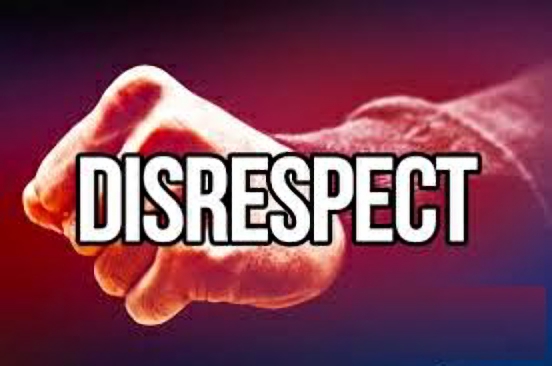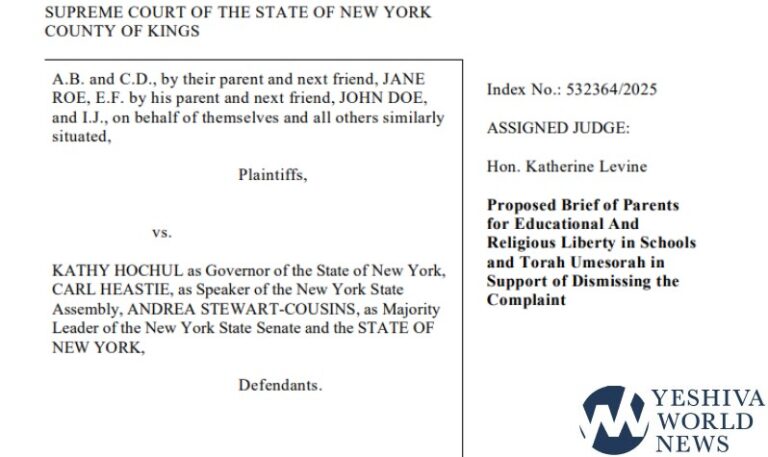By Rabbi Yair Hoffman
The primary dictionary definition of the term “disrespect” that is often found in dictionaries is, “the lack of showing respect.” Other dictionaries offer the following definition: “acting rude, impolite, or offensively.” The general intent of these definitions is that the disrespect is directed toward people. In terms of halacha, however, the term is applicable not just to people, but also to Mitzvos. In this article, we will discuss this idea.
SOURCE
The Gemorah in Shabbos (22a) discusses the Mitzvah of Kisui HaDam, covering the blood of certain animals and fowl that were slaughtered. The Gemorah explains that the juxtaposition of the words, “veshafach” and “v’chisa” tell us that he must do perform the covering with what he had poured – i.e. the Mitzvah must be done with his hands – not with his feet. This is so that the Mitzvos will not be treated disrespectfully upon him.
We extrapolate the idea from this source, and apply it to other Mitzvos as well.
The Sefer Chassidim (825) explains that by the same token it is forbidden to spit or perform another demeaning act in the place where he had performed the Mitzvah of covering the blood, Kisui HaDam. There are a number of other examples too.
UNDERLYING ISSUE
It should be known, however, that the Rambam explains (Hilchos Shchita 14:1) that underlying issue is the disrespect to the One who Commanded the Mitzvos, not to Mitzvos themselves. In Judaism, the relationship that one has with Hashem is paramount. When we show respect to Hashem’s Mitzvos, we further our relationship with Him. This is what life is all about.
BIBLICAL OR RABBINIC
Is avoiding disrespecting a Mitzvah a Biblical prohibition or a Rabbinic one? Believe it or not, it is a huge debate among the Poskim. The Shaages Aryeh (Siman 40) holds that it is Biblical as does the Pnei Yehoshua (Baitza 30b), and Chayei Adam (68:2). The Tosfos (Shabbos 22a “Sukkah), however, seem to indicate that it is a Rabbinic prohibition.
SO WHAT SHOULDN’T BE DONE?
It is forbidden to perform a Mitzvah in a place that is unclean. This is considered a manner of Bizayon – disrespect (Biur Halacha 588). Fulfilling a Mitzvah with dirty hands, however, is not considered Bizui Mitzvah (Tosfos Brachos 14b UManach). This is only true is one is not reciting a blessing. (Chayei Moshe, Kllei haMitzvos p.14).
SLEEPING
Sleeping while wearing Tefillin is a problem of Bizui Mitzvah (Rav Shulchan Aruch 44:1). Hanging Tefillin on a peg is also a problem of Bizui Mitzvah (SA 40:1). Many Poskim forbid sleeping in a large Talis (Bais Yoseph citing Kol Bo SIman 21). Some Poskim also forbid laundering a Talis at a gentile launderer on account of Bizui Mitzvah.
GLOVES
One should not perform a Mitzvah while wearing gloves so that one not dirty his hands while performing a Mitzvah. Doing so is disrespectful toward the Mitzvah (See SA OC 651:7 and MB 33).
PREVIOUSLY USED
One should not create an item for a Mitzvah from something that was used for something degrading. For example. one may not make a Tefillin bag out of a used pair of pants (See SA 11:5 and MB 147:13).
Removing Tzitzis from a garment and then not putting it on another garment is a bizayon to the Beged. It takes it away, it seems from the honor of having had Tzitzis upon it (Teshuvos V’Hanhagos Vol. II #13). This is perhaps slightly different because it is not disrespecting the Mitzvah itself, it is disrespecting an item of Mitzvah.
A WHOLE ITEM VERSUS A PIECE
There is a halacha in regard to hilchos brachos that when we have a slice of something and a whole food item, we recite the blessing on the whole food item (MB 168:1). Some Poskim have questioned what the rationale of this halacha is. Perhaps the origin may be on account of Bizui Mitzvah of the bracha, or kavod of the Bracha.
When doing renovation in a shul or school the question sometimes arises as to whether it is permissible to change what was formerly a bathroom into a Beis Midrash. Some Poskim permit it if in the renovation the previous room is knocked down completely (Tiferes Banim p. 71).
Refusing the honor of being Sandek is also forbidden on account of Bizui Mitzvah (Bais Yisroel Vol VIII p. 247). What Mitzvah is there in being Sandek? The Ramah writes that (YD 265:11) that the Sandek is equated to the Kohain who offers the incense in the Temple, and it is a segulah for becoming wealthy.
As a parenthetic note in regard to the point of the Ramah of Sandekaus being an origin for wealth, the Vilna Gaon points out that we have not seen Sandekaus responsible for gaining wealth. In answer to the Vilna Gaon’s point, Rav Yaakov Kamenetsky zt”l in his Emes L’Yaakov explains that the reason why no one is becoming wealthy is because the intent is for the Sandek to be the Baal Bris as well, in other words picking up all the expenses of a Bris.
SPECIFIC HOLIDAYS
It would also be forbidden to count money next to Chanukah candles even temporarily as this is considered Bizui Mitzvah (SA 673:1)
Our custom in regard to the Arba Minim is to recite the bracha of Netilas Lulav while the Esrog is upside down and then to flip it over immediately upon reciting the Bracha. The Vilna Gaon 655:5 disagrees with the notion of flipping the Esrog upside down on account of Bizui Mitzvah. It is said that the Chazon Ish did not flip the Esrog for this reason (Teshuvos V’Hanhagos Vol. III #196). What then was their Minhag? They either recited it immediately before taking the four minim or they specifically had in mind not to fulfill the Mitzvah until after the bracha was recited. Some Poskim question whether the latter option is permitted.
The Chayei Adam cited by the Mishna Brurah (473:32) was quite perturbed by the fact that many people would simply throw out the Zroah (the shank bone) from the Seder plate. His animadversion was on account of Bizui Mitzvah, of course.
Many people are unaware of the concept of Bizui Mitzvah. We see, however, that it certainly has wide-ranging applications. With the spreading of knowledge of these halachos, may we all merit to develop a greater relationship with the Commander of all Mitzvos, HaKadosh Boruch Hu. Amen.
The author can be reached at [email protected]












4 Responses
What is the proper method of disposing of the Zroah after the sedarim, since it cannot be eaten?
Kitzur Shulchan Aruch (9:8) warns not to let tzitzis drag on the floor because of bizui mitzah and suggests tucking them into one’s garments to avoid this.
The zeroah should be wrapped up (covered) before disposing of it!
Tzitzis dragging on floor: Magen Avraham says in name of the Agur (quoted in Bet Yosef) that about one who drags his tzitzis on the floor, the verse (Isaiah 14, 23) says “and I will sweep it with the broom of destruction”.
The Magen Avraham cites two Gemarot that apparently contradict the Halacha stated by the Agur.
Berachot 18a:
Rabbi Chiyya and Rabbi Yonathan were once walking about in a cemetery, and the blue fringe of Rabbi Yonathan was trailing on the ground. Said Rabbi Chiyya to him: Lift it up, so that they [the dead] should not say: Tomorrow they are coming to join us and now they are insulting us
The problem was that the Tzitzis of Rabbi Yonathan were dragging on the graves. From this Gemara, we learn to hide Tzitzis in cemetery. To walk in cemetery with appearing tzitzis seems as we make fun of death they have no more mitsvos. Magen Avraham asks. The disrespect for death is the only problem! What about the problem of dragging the ground?
Gittin 56a:
Ben Zizith Hakeseth was so called because his fringes [Tzizis] used to trail on cushions [keseth].
If his tzitzit trail on cushions, the tzitzit of standard men trail on the ground, this is not a problem.
Magen Avraham suggests that this might apply only while the tallis is being worn, but not when it is not worn. However, Shulchan Aruch Harav (21:5) omits the term “while they are worn,” implying that one should always be wary of dragging tzitzis strings on the ground. This is also stated in Birkei Yosef.
The Kaf Hachayim says in the name of the Nahar Shalom that the problem cited by the Agur is a case in which the tzitzit drags constantly on the ground. But if the tzitzit touches from time to time the ground, there’s no problem. Other poskim said that the problem is when one steps on tzitzios.
According to the Kaf Hachayim the reason for which the Mechaber did not quote the words of the Agur in SA is the fact that the two Gemarot above cited seem to contradict him.
Also, that Halacha refers to the dragging of the tzitzit on the ground as you move around as is evidenced from the language of the Halacha and the pasuk (“broom”). But to just sit and have them touching the floor is not mentioned as being a problem.
Further, Mekor Chaim writes that the instruction to avoid dragging tzitzis on the ground is only out of midas chassidus.